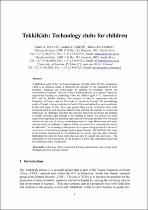JavaScript is disabled for your browser. Some features of this site may not work without it.
- ResearchSpace
- →
- Research Publications/Outputs
- →
- Conference Publications
- →
- View Item
| dc.contributor.author |
Marais, Mario A

|
|
| dc.contributor.author |
Smith, Andrew C

|
|
| dc.contributor.author |
Duveskog, M

|
|
| dc.date.accessioned | 2008-05-28T07:36:42Z | |
| dc.date.available | 2008-05-28T07:36:42Z | |
| dc.date.issued | 2007-04 | |
| dc.identifier.citation | Marais, MA, Smith, AC and Duveskog, M. 2007. TekkiKids: Technology clubs for children. Meraka Innovate Conference. Pretoria, South Africa. 18-20 April 2007, pp 8 | en |
| dc.identifier.uri | http://hdl.handle.net/10204/2256 | |
| dc.description.abstract | TekkiKids is a part of the The Young Engineers of South Africa (YESA) programme which is an initiative aimed at increasing the pipeline for the generation of more scientists, engineers and technologists by creating the necessary interest and involvement of learners. The aim of the TekkiKids project is to research hands-on, experiential learning via technology clubs for children aged 9-12. Sponsored by DST and the Finnish Embassy, this research is done in partnership with the University of Pretoria and the University of Joensuu in Finland. The methodology used in Finland is being replicated in South Africa and adapted to local conditions. In the pilot phase of this three year project three groups of learners from well-resourced and less well-resourced schools were selected and exposed to science and technology via challenges and other fun activities that cover the design and building of simple structures right through to the building of robots. We discuss our initial experiences regarding the dynamics of paring well-resourced and less well-resourced schools and the use of various technologies such as Lego Mindstorms and waste materials such as cardboard. Computer literacy proved to be a constraint that had to be addressed. The technology clubs proved to be a good testing ground for the use of novel ways of introducing concepts such as programming. The difficulty that some of the learners experienced in constructing devices using Lego and other materials highlighted the need for basic skills that can only be gained via experience. The implications of our experiences, in the design of a three year curriculum framework for technology clubs, is discussed. | en |
| dc.language.iso | en | en |
| dc.publisher | CSIR. Meraka Institute | en |
| dc.subject | Technology clubs | en |
| dc.subject | Experiential learning | en |
| dc.subject | Edutainment | en |
| dc.subject | Intelligent physical learning objects | en |
| dc.title | TekkiKids: Technology clubs for children | en |
| dc.type | Conference Presentation | en |
| dc.identifier.apacitation | Marais, M. A., Smith, A. C., & Duveskog, M. (2007). TekkiKids: Technology clubs for children. CSIR. Meraka Institute. http://hdl.handle.net/10204/2256 | en_ZA |
| dc.identifier.chicagocitation | Marais, Mario A, Andrew C Smith, and M Duveskog. "TekkiKids: Technology clubs for children." (2007): http://hdl.handle.net/10204/2256 | en_ZA |
| dc.identifier.vancouvercitation | Marais MA, Smith AC, Duveskog M, TekkiKids: Technology clubs for children; CSIR. Meraka Institute; 2007. http://hdl.handle.net/10204/2256 . | en_ZA |
| dc.identifier.ris | TY - Conference Presentation AU - Marais, Mario A AU - Smith, Andrew C AU - Duveskog, M AB - TekkiKids is a part of the The Young Engineers of South Africa (YESA) programme which is an initiative aimed at increasing the pipeline for the generation of more scientists, engineers and technologists by creating the necessary interest and involvement of learners. The aim of the TekkiKids project is to research hands-on, experiential learning via technology clubs for children aged 9-12. Sponsored by DST and the Finnish Embassy, this research is done in partnership with the University of Pretoria and the University of Joensuu in Finland. The methodology used in Finland is being replicated in South Africa and adapted to local conditions. In the pilot phase of this three year project three groups of learners from well-resourced and less well-resourced schools were selected and exposed to science and technology via challenges and other fun activities that cover the design and building of simple structures right through to the building of robots. We discuss our initial experiences regarding the dynamics of paring well-resourced and less well-resourced schools and the use of various technologies such as Lego Mindstorms and waste materials such as cardboard. Computer literacy proved to be a constraint that had to be addressed. The technology clubs proved to be a good testing ground for the use of novel ways of introducing concepts such as programming. The difficulty that some of the learners experienced in constructing devices using Lego and other materials highlighted the need for basic skills that can only be gained via experience. The implications of our experiences, in the design of a three year curriculum framework for technology clubs, is discussed. DA - 2007-04 DB - ResearchSpace DP - CSIR KW - Technology clubs KW - Experiential learning KW - Edutainment KW - Intelligent physical learning objects LK - https://researchspace.csir.co.za PY - 2007 T1 - TekkiKids: Technology clubs for children TI - TekkiKids: Technology clubs for children UR - http://hdl.handle.net/10204/2256 ER - | en_ZA |






